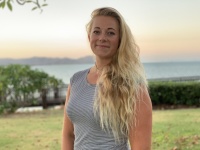

Callaway Thatcher
callaway.thatcher@my.jcu.edu.au
PhD
College of Science and Engineering

Callaway Thatcher
callaway.thatcher@my.jcu.edu.au
PhD
College of Science and Engineering
Coral Probiotics
Callaway was born and raised in Utah, U.S.A where she also earned a Bachelor's degree in Biology from Utah Valley University in 2018. After which she was hired at the largest microbiology laboratory in the world (Nelson Laboratories, Salt Lake City Utah) where she worked for a year to save for graduate school. Soon after she received a scholarship to attend James Cook University to study marine biology, where she graduated from her program with distinction in 2020 and completed a minor project at AIMS studying the potential for using probiotics to assist in propagating corals in aquaculture. This project transitioned into a Ph.D. in the same field with a focus on micro and molecular biology to answer fundamental questions that will be pivotal to developing effective probiotics for corals.
Coral Probiotics
2021 to 2024
Project Description
Bacterial probiotics are routinely applied in a range of fields including human health, agriculture, and aquaculture. However, the development of beneficial bacteria that maximise coral health is complex and in its infancy. This project will isolate and screen probiotic candidates targeting functions expected to enhance coral nutritional condition, growth, and resilience to disease under captive conditions. A combination of in vitro and in vivo screens will evaluate relevant functions and the survival and retention of candidates after delivery to early life stages, asexually produced coral, and broodstock. The overarching goal is to develop the resources and know-how needed to use bacterial probiotics for enhancing coral settlement, growth, nutritional condition, and resilience to stress and disease.
Project Importance
The development of effective probiotics is one scalable cost-effective tool that can greatly aid in the production of coral in aquaculture systems for ornamental trade, research purposes, and reef restoration. The field of coral microbiology and probiotics is in its infancy with much to be learned on the metabolic interactions within the coral holobiont that underpins health and resilience. Delicate relationships exist as an elaborate network between all members of the holobiont and shifts in members or density of the microbiome community occur as a result of stress. These shifts may result in decreased coral fitness and health and while our mechanistic understanding of these relationships is limited, manipulation of the microbiome may confer health benefits to one or more members of the holobiont. Identification of CAB at all life stages is required and determining their functions will be a critical step in creating effective and versatile probiotic cocktails. Maintenance of microbial associations and activity post probiotic application is also a central consideration for probiotic development, in particular for probiotics that require host colonization and proliferation to express the traits of interest. There is much work to be done to successfully apply probiotics to improve coral aquaculture, though opportunities exist for industrial applications that could help corals and reef ecosystems more broadly.
Project Methods
1. Microbial isolations
2. Molecular work
3. Quantitative experiments in controlled environments
4. Statistical analyses
5. Bioinformatics
Project Results
1. Isolate coral-associated bacteria from various life stages (egg/sperm, larvae, juvenile, adult)
2. In vitro screening of isolated bacteria
3. Determine if larvae and juvenile corals can retain added bacteria in the form of a water inoculum
4. Developing appropriate tracking tools for in vivo visualization of probiotics delivered to coral recruits
5. Optimizing treatment regimens by tracking probiotic cocktails and measuring health benefits in coral recruits overtime
Keywords
Aquaculture,
Bacteria,
Climate change,
Controlled Environment,
Coral reefs,
Corals,
Disease,
Genetics,
Manipulative experiments,
Microbial,
Microbiology,
Molecular techniques,
Quantitative marine science